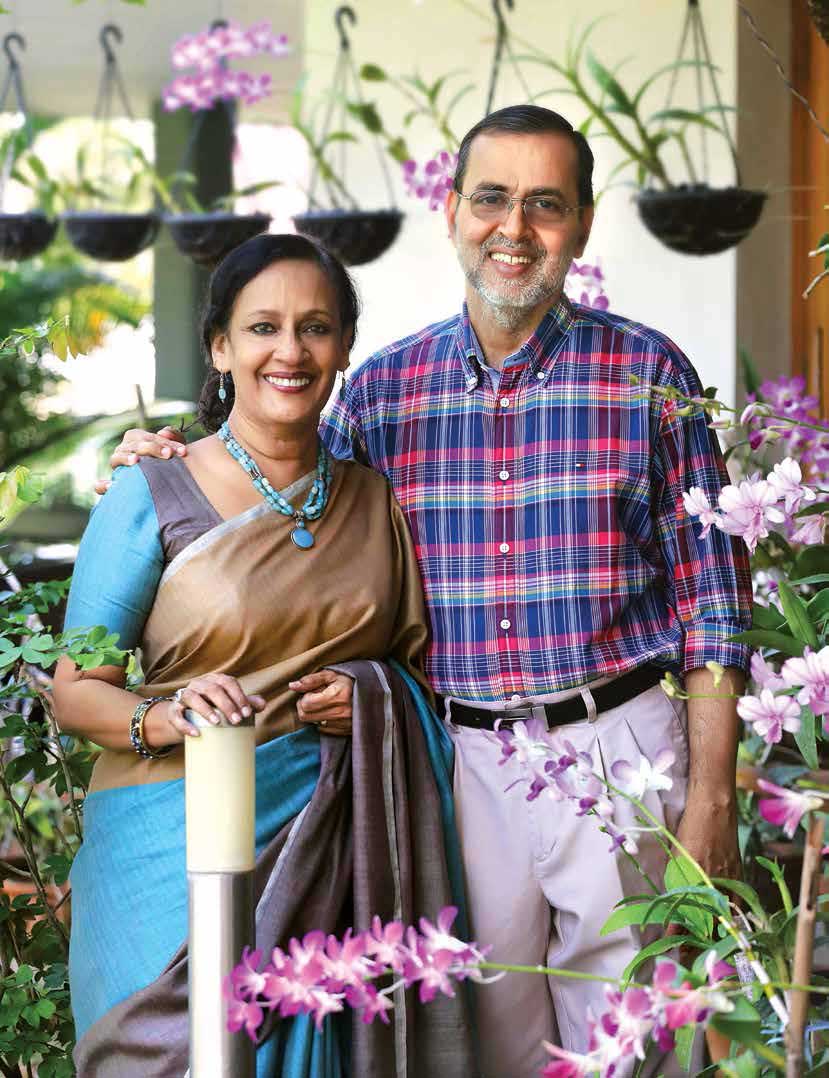
From voltage stabilisers to pumps, motors, water heaters, amusement parks and resorts to garments and lingerie, organ donation to writing and painting, even standing up for human rights over those of stray canine, Kochouseph Chittilappilly, founder of the V-Guard empire and wife Sheela, creator of the V-Star line have given wings to businesses and inclinations, turning them into worthwhile pursuits. At the heart of these ventures is a man who wanted to earn a four-figure income every month, and a woman who didn’t want to sit idle. Corporate Citizen checks out what makes this couple tick
Most of V-Star’s units are run by nuns, inside the convents, who work to provide employment to jobless women in remote areas. Because of this, there is no political interference, and production is no problem
The Kochi-based V-Guard group has grown in a little under four decades to an almost Rs.2,000-crore giant. When Kochouseph Thomas Chittilappilly set up his small company in 1977 to manufacture voltage stabilisers – the first of which he carried on his scooter to deliver to the buyer - he hardly dreamt that it would grow over the years to encompass a diversified product range that includes pumps and motors, electric and solar water heaters, wiring cables, uninterrupted power supply (UPS) systems and ceiling fans – as well as amusement parks and a resort!
But business boomed, and V-Guard is today the largest-selling stabiliser brand in India, with more than 500 distributors, 3,000 dealers, 20,000 retailers and a network of service centres across India. This infrastructure also looks after the sales and service of the pumps, water heaters – both electric and solar – and electrical cables, for which there is a plant at Coimbatore, just across the border in Tamil Nadu. The company has a market share of 20 percent in the Indian UPS segment, 15 per cent in pumps, 12 percent in water heaters and 7 per cent in cables.
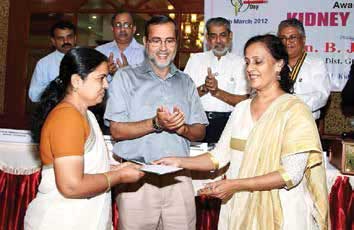
Chittilappilly’s first amusement park in Kochi, Veegaland, has in less than two decades metamorphosed into the Rs.181.87 crore Wonderla Holidays Ltd, which is one of the largest operators of amusement parks in India. In March 2012, it also set up a resort adjacent to its Bengaluru amusement park, under the brand name ‘Wonderla Resort’. Wonderla’s amusement parks offer a wide range of water and land based attractions catering to all age groups, with dozens of water-based and landbased attractions at its three parks.
Today, the founder has taken a backseat from the business, which his two sons look after, and is more of a writer, philanthropist and humanist. Elder son Arun runs the group’s amusement park and resort business, Wonderla, while his brother Mithun is the incumbent Managing Director of the parent company, V-Guard. His wife Sheela, after being a quiet housewife and mother for two decades, got into business, too – but she set up on her own rather than joining Chittilappilly’s V-Guard Industries. Her V-Star Creations makes innerwear for both men and women.
Amusement parks were a totally unrelated diversification for the electronics manufacturer, who decided in 1997 to launch his dream project “to create a monument of my own” as he writes in his book Practical Wisdom. “I would like to be remembered by the coming generations as a man who always thought differently,” he says. And he did think differently: for the first amusement park in Kochi, he didn’t take on an established designer who had specialised in such projects, even though he was investing Rs.42 crore in it – instead, he hired an unknown young mechanical engineer, Joseph John, to design and build it. “I took him to see some amusement parks around the world to get an idea of what we wanted to set up,” he says. “But our maiden Veega Land (its original name, which he has retained for the real estate development company of the group, Veegaland Developers) project, laid out on a 10-hectare property, is the best in every respect: quality, architectural beauty and landscaping, as well as cleanliness and service!” Not surprisingly, he has retained the services of Joseph John for both the subsequent Wonderla parks, in Bengaluru and Hyderabad.
While the founder Chairman and Managing Director of V-Guard is a recipient of the Rashtriya Samman award from the Government of India for being among the highest tax-payers, he was also adjudged the Millennium Businessman of Kerala, Tourism Man of the Year and TMA Manager of the Year in 2000, and the ATTOI Tourism Man of the Year and Newsmaker of the Year awards from leading Malayalam newspaper Malayala Manorama, in 2011. In addition, he has founded the K. Chittilappilly Foundation, a non-profit organisation to engaged in charitable and philanthropic activities, and is the Chairman of the Stray Dog Free movement, under which banner he has criticised legislation forbidding the killing of stray dogs and advocated government action to address the ‘menace’ in his home state of Kerala. He became an author, too: after his first book, Practical Wisdom in 2005, which is an account of practical management techniques he has derived from his personal experiences, he went on to make it a trilogy with Practical Wisdom 1: In Real Life and Management in 2010 and Practical Wisdom 2: In Real Life and Management two years later. In between, he published his autobiography in Malayalam, Ormakkilivathil (Down Memory Lane) in 2011 which had the foreword written by the renowned Malayalam writer, T. Padmanabhan.
When his factories were shut down due to a workers’ strike, Chittilappilly introduced a new business model of total product outsourcing, coupled with in-house quality control
Kochouseph Chittilappilly, born at Parappur in Thrissur in 1950, had his early schooling at the local church school, then graduated from Christ College, Irinjalakuda and earned a Masters degree in Physics from St. Thomas College, Thrissur. In 1973, he got his first – and only – job, as a supervisor at Telics, a Thiruvananthapuram-based electronics company manufacturing voltage stabilisers and emergency lamps. The company was not doing well. “My future was doubtful,” he says. So, four years later, he set up V-Guard Industries at Thrissur, with a capital of Rs.one lakh which he borrowed from his agriculturist father. “When my longing to become a scientist couldn’t find a way forward, at the age of 27 the industrialist in me took shape,” he says in a Facebook post.
“My ambition was to earn Rs.1,000 a month instead of the Rs.800 I was getting as salary at my job,” he explains. But that modest ambition grew with the company, which went from its initial two employees to 700 people in 30 years. “In the very first year, we tripled production from hardly 50 stabilisers a month to 150,” he recalls. “We made steady progress, spreading out from central Kerala to the entire state, then expanded our marketing network into the neighbouring Tamil Nadu and Karnataka. From stabilisers for refrigerators, we began making them for air-conditioners and television sets, too.”
Labour problems in his home state in the 1980s prompted a movement in production that followed his marketing, to a chain of small units all over the southern states. When his factories were shut down due to a workers’ strike, Chittilappilly introduced a new business model of total product outsourcing, coupled with in-house quality control.
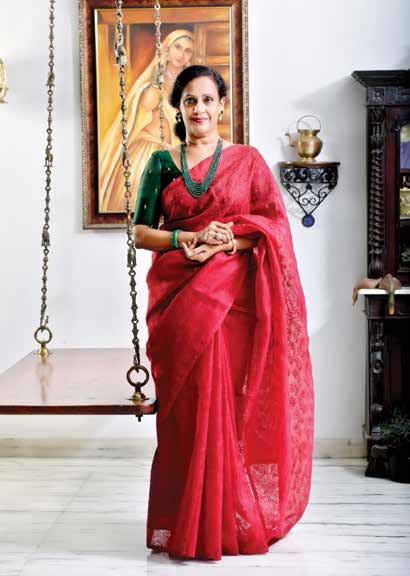
Sheela Chittilappilly, for her part, decided after her two sons were grown up and studying in the tenth and eighth standards, that she “shouldn’t waste my time in the kitchen” but do something useful. “One of my biggest qualities is that I am a woman who wants to work hard – I was the 11th child and lost my father when I was 15, so I matured very early and learned to take on responsibilities – I had to go on my own for my college admission,” she says. “Then I took on the responsibility of supporting myself and my mother at a young age.”
Sheela believes strongly that every woman should have her own income. “That gives freedom, decision making ability and respect,” she explains. “Women’s empowerment can come only from economic freedom. I have seen the problems that my mother faced after my father died, and I didn’t want to be like that – depending on someone for everything.”
So as soon as her sons were ready to fly on their own, Sheela didn’t want to waste time – even though she didn’t need to do anything because she already had a house, a car and all the comforts anyone can want. “My husband also supported me, despite knowing the challenges I would have to face,” she adds. She began by working in her husband’s business – but “electronics was Greek to me!” she laughs
Being a home science graduate, she enrolled for and completed a one year certificate course in garment making and embroidery, and launched her own company in 1995 to make a range of branded salwar-kameez sets. “I also had experience of stitching clothes for myself as well as my cousins and nieces,” she points out. “I have been very creative since I was a girl, I used to make my own dolls – and I stitched my own skirt and blouse when I was in the seventh standard. I also learnt about fabrics and their quality, because my father had a shop selling textiles. And there was a tailor there, so I got the basics of stitching from him.”
Her business grew, and in 2002 she expanded – not outward, but inward into lingerie, beginning with brassieres. “There were many teething problems – but ultimately, the shopkeepers were very happy with our dealing, unlike others who often delayed supplies. So penetrating the market was easy, even though we introduced it at a premium price; and our product was welcomed by the women for whom it was meant – after all, I am a woman and can do my own R&D! People also had great trust in our brand, for both quality and the fact that when we say ‘100 percent cotton’ that is what they get.” This ensured a good market for panties, which she launched in 2005; and Vanessa became the largest selling brand in Kerala.
This success prompted a move into men’s innerwear in 2008, under the brand name Valera – but it was this very factor that made the going tough for the new product. While there is a lot of competition from national and international brands, the fact that V-Star had the tag of being a “women’s brand” put off many men. But she persisted, and won through.
She however got out of the first business, of outerwear. “It is a good market, though there was a lot of competition from Mumbai,” she explains. “But I found it very difficult to get skilled workers here for hand embroidery and such work – I had to bring them from Mumbai, which was very expensive, and I couldn’t compete. An additional problem I discovered was women in different parts of the state want different styles: Kozhikode, Kottayam, Kochi – all want variations of colours and sleeve lengths, from sleeveless to full sleeves. It wasn’t worth it to make so many different versions of the same design!” But she has got into printed leggings and T-shirts for women, as well as polo shirts, track pants and T-shirts for men.
The bra business continues to be the biggie: Vanessa now has three exclusive outlets which opened in Kochi last year. There is also one in Thissur. Similar stores are coming up in Thiruvananthapuram and Kozhikode. “Having our own showrooms boosts the visibility of our brand,” Sheela says. “We have 85 types of bras, but any normal dealer stocks only a maximum of 20 of these – usually, they have only about five. In our shop, we obviously keep all 85. We also export 15-20 percent of our production to Gulf markets, mainly for Malayali customers who have had exposure to our brand. We also started marketing in Tamil Nadu and Kerala two years ago.”
Thomas Chittilappilly Trust, a charitable venture named after his father, runs two institutions—an old age home where elderly people are housed and provided with sustenance and medical care, and Shantimandiram, a home for destitute children where they are provided with shelter, education and food
“We have 17 manufacturing units in Kerala, with 50 to 60 women and girls working in each,” she explains. “That’s a total of about 1,000 female employees. Most of our units are run by nuns, inside the convents, who work to provide employment to jobless women in remote areas. Because of this, there is no political interference, and production is no problem. If not for this, it would be very difficult to run the operation, because no Malayali wants to go far from his or her home. Otherwise, all the tailors are from Bihar or Kolkata. We also have a good design centre in Tiruppur, where we do part of our production of the men’s innerwear and other knitted garments, too.”
With all four members of the family handling four divergent businesses – Chittilappilly himself now concentrates on Veegaland Developers – Sheela says she needed to grow very aggressively. “My competition is not only from other brands, but at home where we meet every evening!” she grins. She had set herself a target of Rs.100 crore for this year, but V-Star Creations will achieve only 90 percent of this as the market is rather dull thanks to the depression in the prices of rubber, which is Kerala’s main cash crop. “But we have still grown 30 percent: that is very good!” she adds on a positive note.
Even when she is not working, she never sits idle: “I want to learn and do so many things!” she says. “I begin my day with one hour of exercise every morning. This gives me a lot of energy at my age: I am 62 years old. Then I make the coffee and do the cooking, so we don’t keep a full-time servant in the house. My exercise, housework and business keep me so energised that I never get tired. So I don’t lie down in the afternoon, but do some painting.” Her informal ‘studio’, filled with finished and work-in-progress canvases, an easel and paint, is on the landing at the top of the staircase in their large bungalow, Chittilappilly House. “I was a sports girl – I played hockey for my University,” she explains. “I was busy looking after my family till 2000, but now I live as I did 30 years ago.”
Except, she adds, that 30 years ago she couldn’t have talked so confidently to strangers, or given an interview to the media. “A routine like mine helps self-development, personality improvement and confidence. And, of course, economic independence is very important, too.
While Sheela continued to blossom and grow as a home-maker, businessperson and artist, her husband’s business kept growing, too. “Though we have introduced eight or nine different products, voltage stabilisers are still the main one, accounting for 20-22 percent of V-Guard’s turnover,” Chittilappilly says. “The Indian reality is that power fluctuations are so high that people still don’t want to take a chance on their expensive equipment getting damaged. But the growth level is not so high, the turnover has increased by only about 10 per cent.”
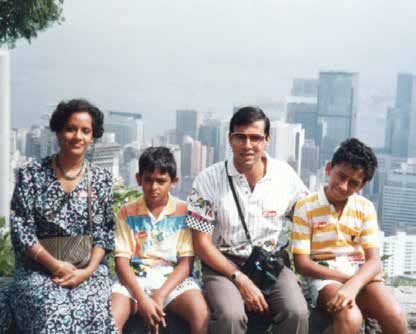
Having “slowly withdrawn from the mainstream business” and handed over the reins of his two entrepreneurial babies to his sons Arun and Mithun, Kochouseph Chittilappilly is now what he calls a “back-seat observer”. He obviously got bored with this comparative inactivity – in 2013, he set up Veegaland Developers as another unrelated diversification. “I look after it,” he says. “We have two or three projects in and around Kochi, building 180 residential apartments as well as 11 premium apartments of 8,500 sq ft each, covering an entire floor of the building – which will have a rooftop swimming pool, health club and Jacuzzi, all covered.”
How does he think things have changed under the new governments in the state and at the centre, with the latter’s accent on making things easier for entrepreneurs to start up their own businesses? “Things are different from the earlier days, when private entrepreneurship and making profits were considered dirty,” he says. “There are so many successful examples today.” On the other hand, he says he has always believed that it is up to every entrepreneur to struggle for himself or herself and not look for government support: “Spoon feeding will only make you a spoilt child!” he laughs.
His wife, however, does not share his positive view of the present situation: “We have heard these things many times. The question is, how far will they materialise?” she feels. “The biggest problem in Kerala is infrastructure. That needs a lot of improvement – look at our roads, for example: one rain, and everything goes away, like chapatti atta! There are no footpaths for pedestrians; and our cities are full of garbage...”
Side by side with his business, Chittilappilly has kept up a stream of philanthropic and humanitarian activities, setting up the eponymous K. Chittilappilly Foundation in Kochi to take care of not only his work in various fields in India, but also to oversee the activities of Thomas Chittilappilly Trust, another charitable venture which is named after his father. This runs two institutions - an old age home where elderly people are housed and provided with sustenance and medical care, and Shantimandiram, a home for destitute children where they are provided with shelter, education and food. The institutions are managed by the Sisters of Nirmala Province, a provincialate of Catholic nuns located at Kolazhy in his home town Thrissur.
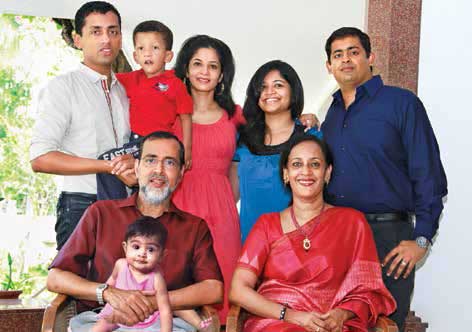
The Foundation has also instituted an organ donation award to recognise people who come forward to donate their organs and to promote organ donation. It also offers awards for families which donate the organs of their brain-dead relatives. The awards, ranging from Rs.one lakh to Rs.five lakh, total Rs.37 lakh every year.
Chittilappilly himself donated one of his kidneys in 2011, to a truck driver who was a total stranger. He started an organ donor chain, where one of the family members of the recipient had to donate an organ himself or herself. Chittilappilly led from the front, becoming the first depositor with the Kidney Federation of India (KFI), and is now closely associated with the movement.
The man himself is quite blase about all this. “What inspired me was a book by Sarat Chandra, which dealt with kidney transplant,” he says modestly. “A distant relative - my daughter-in-law Priya’s mother - had a kidney problem, and I had watched what happened from a distance: the struggle, the agents, the money being spent, and so on. I had never thought of my kidneys till then, but I got involved. I started joking with my family members about why I couldn’t donate a kidney, I was still a healthy person. Then my own experience as a donor, my thoughts about why and how I did it, and the reaction from my own family and the public at large...”
Another inspiration was the example of Father Davis Chiramel, parish priest at the St Francis Xavier Church in a village near Chittilappilly’s home town Thrissur, who donated his kidney to a non-Christian who needed one desperately. He didn’t give a thought to the fact that, at age 59, he was 11 years older than the priest. He got himself checked medically, and found that he was in good health – a precondition for a donor. He went to meet Fr Davis, who told him about the 49-year-old truck driver, Joy Ulahannan. Another check showed that he was a good match – and the rest is, as they say, history.
His wife was, of course, against the operation: “I was scared!” she says in retrospect. “Actually, his sisters and other family members were even more concerned than I was. But he is very adamant and strong, he won’t listen to anyone once he has made a decision.” But that, she adds, is the essence of a successful marriage: “You must never try to change the other person, because you can’t do it. A good relationship is all about adjustment and sharing.”
You must never try to change the other person, because you can’t do it. A good relationship is all about adjustment and sharing
Their personal philosophies of life and living do not exactly match, but they don’t differ too much, either. “Live happily, doing the best you can for your fellow passengers in this world,” Sheela says. “Be positive – because everything is possible, there is nothing that you cannot do.” Her husband, for his part, believes similarly that “human beings have a lot of talent and ability”, which they only need to develop. “It is up to you to decide for yourself up to what level you want to grow,” he adds. “There is no meaning in blaming others or complaining.”
Chittilappilly is happy with the effect his organ donation movement has had so far. “Awareness has increased manifold in Kerala,” he points out. “Earlier, even close relatives were hesitant to donate organs to family members who desperately needed a transplant. Actually, many people – even educated people – don’t know today, too.” Beyond his home state, awareness has surely grown since October 2015, when Reader’s Digest magazine carried a lead story headlined The Priest and the Industrialist, detailing what Fr Davis and Chittilappilly have done.
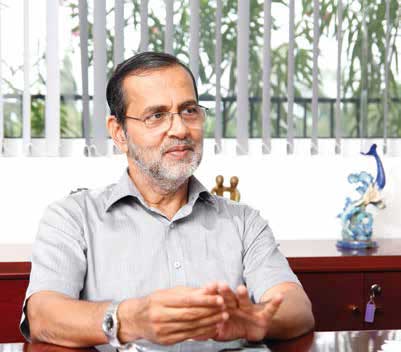
Stray dogs are a problem everyone has faced, and controlling them has always been a vexed problem with some people wanting them exterminated and others advocating a humane approach like vaccinating and neutering them. Chittilappilly is the chairman of the Stray Dog Free movement, which advocates strong action, including the amendment of legislation forbidding the killing of these dogs. The movement has pointed to the danger of rabies. Chittilappilly has staged hunger strikes to protest this legislation, and what he says is the government’s failure to address the issue. “The government’s actions amount to valuing stray dogs over human lives and property,” he says. He has encouraged citizens to not only bring pressure on the government to amend these laws, but even to kill stray dogs themselves despite the ensuing fine. Setting an example himself, he has been arrested under laws preventing cruelty to animals after tying four stray dogs in front of a police station.
The movement favours government plans to cull stray dogs, which prompted an international campaign to “Boycott Kerala Tourism”. With members and opponents of the Stray Dog Free movement arguing and making allegations against one another, the issue continues to hang fire.
In one of his regular Facebook posts, Chittilappilly has “a humble note to the dog lovers who are pained by my fb posts on stray dogs...” Clarifying that he personally has nothing against dogs, he says: “My first preference goes to the safety and wellbeing of my fellow human beings. That’s because I’ve seen in person as well as through media some of the most gruesome incidents narrated by victims of dog attacks.”
We read news about domestic animals bitten to death by stray dogs on a daily basis. I wonder why animal lovers don’t care about their welfare as well
According to the available data on the net, he points out to his detractors, more than 27,800 people had sought treatment for dog bite in various government hospitals in Kerala alone in 2013 and `10 crore had been spent on treatment. Eleven had died. At another forum, he quoted World Health Organisation statistics that 55,000 people die around the world every year owing to rabies. “Asian and African countries top the list and a good number of victims are from India, especially children,” he said. “Children, women, two-wheeler commuters, etc. are constantly attacked by stray dogs. We read news about domestic animals bitten to death by stray dogs on a daily basis. I wonder why animal lovers don’t care about their welfare as well. Officials with the Kochi Corporation admit that they receive over 100 complaints related to stray dog menace on a daily basis... Therefore, let me reiterate, I choose to love human beings more than stray dogs.”
He also feels very strongly about ‘leaving the world with dignity’. In another post, he says: “When death is imminent and obvious in case of terminal illness or failure of your body systems, I feel it is a forced cruelty to prolong life through artificial methods like ventilators, painful surgeries, bringing along with it financial and emotional burden to your near and dear. Hence I have approached the judiciary for legal sanction for a natural death.”
Back at business, Chittilappilly exhibited his concern for the environment when he asked the architects building V-Guard’s new corporate office to use every possible method of minimising any damaging impact on the earth. “We now have the finest cross-ventilation, solar power, water treatment and more,” he says proudly of the new 12-storeyed structure which was designed with the prime objective of creating an environment–friendly building, using green building principles from concept to commissioning.
And so the V-Guard empire, created by a man who wanted to earn a four-figure income every month, and the V-Star business, started by a woman who doesn’t want to ever sit idle, march on shoulder to shoulder, just as their founders do.
By Sekhar Seshan